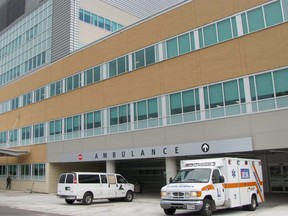
Bluewater Health is ramping up diversity, equity and inclusion training as part of its newest quality improvement plan.
Aligning with a strategic plan that includes equity as one of five key focuses at the hospital group, the goal in 2023 is to get one-quarter of all staff trained, said president and chief executive Paula Reaume-Zimmer.
The training — referred to as equity, inclusion diversity and Indigeneity (EDI), or anti-racism or anti-oppression training — is being done in concert with community partners, she said.
“Really helping to kind of have a unified approach to EDI in the community,” she said.
“And knowing that Bluewater Health is a large employer, we need to be supporting our culturally diverse community within Bluewater Health so we can respond to our patients and families better as well.”
All staff will be offered training in the next year and the goal is for 25 per cent, or 463 people, to complete it by the end of March 2024, she said.
Hospital group leaders also will be trained by then, Reaume-Zimmer said.
“We certainly need the leaders to be able to model the way,” she said. “And to help the rest of our staff and professional staff and volunteers just embrace a new sensitivity to diversity and anti-racism.”
Hopes are to have all staff trained within four years, Reaume-Zimmer said, noting there are logistical challenges, like making sure people can cover off colleagues attending training.
“We’ll continue to work on that target annually,” she said.
There are different training options, she said, including various workshops, but there will also be opportunities for people to show they’ve received the training elsewhere.
As more training has happened, more people have wanted to follow suit, she said.
“It’s really starting to create a really nice snowball effect on everyone’s feeling of accountability, of wanting to be part of such an important initiative at Bluewater Health.”

Quality improvement plans started at Ontario hospitals after the Excellent Care for All Act took effect in 2010, requiring targets for improvement tying two per cent of executive pay to success.
The Health Ministry waived that obligation amid increased demands on hospitals amid the COVID-19 pandemic, but Bluewater Health is continuing, Reaume-Zimmer said.
“Whether it’s mandated or not, I think that the board wants to continue to monitor that, and it’s a reassuring metric for them to receive on a routine basis,” she said.
The plan continues to track things such as how often the same people return to the emergency department unscheduled within 30 days of their last visit — currently 14.8 per cent, just above the 14.7 per cent target — and overall ratings from patients.
They’ll also look at how long it takes nine out of 10 patients needing admission to get from emergency care to an inpatient bed. Currently that’s 16.5 hours, and the target for this year of the plan is being raised to 14.5 hours, up from 11.2 hours a year ago.
It was dropped last year from 13.9 hours as Bluewater Health’s time was 7.4 hours in 2021, largely due to the COVID-19 pandemic, said Reaume-Zimmer.
“Post-pandemic. . . we’re having the higher volumes of individuals who have kind of held out on their health-care needs, and that’s influenced the increase now,” she said. “So it’s course correcting and still a very important target for us.”
Another plan priority is dealing with violence against staff, Reaume-Zimmer said. “We have several education initiatives” including drills and mock events.
The number of violent incident reports has been relatively stable the last two years, at 171 in 2022-23, and 176 the year before, hospital officials said. There were 158 incidents reported in 2020-21.
The hospital group has been making efforts to encourages reporting.
“A big focus is on prevention” including education focusing on de-escalation tools and resources, spokesperson Julie Franchuk said.

Comments
Postmedia is committed to maintaining a lively but civil forum for discussion and encourages all readers to share their views on our articles. Comments may take up to an hour for moderation before appearing on the site. We ask you to keep your comments relevant and respectful. We have enabled email notifications—you will now receive an email if you receive a reply to your comment, there is an update to a comment thread you follow or if a user you follow comments. Visit our Community Guidelines for more information and details on how to adjust your email settings.
Join the Conversation